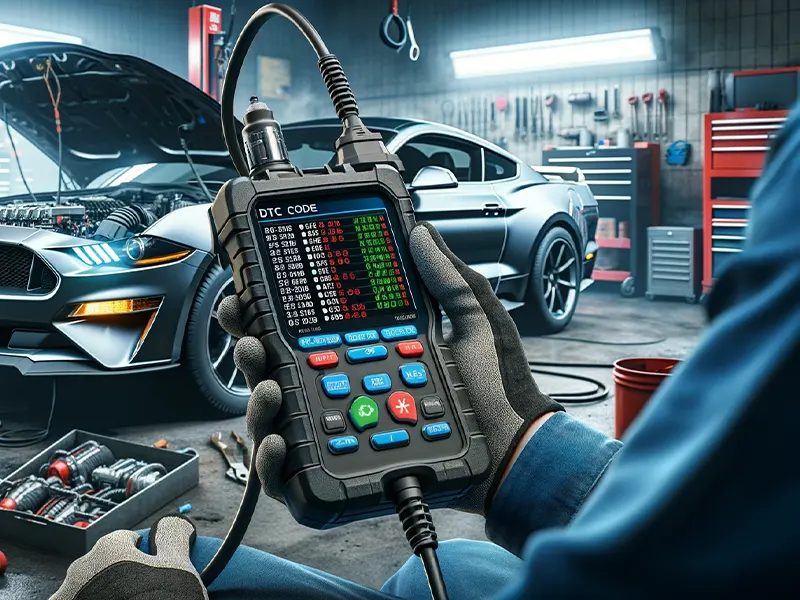When your Mustang’s check engine light comes on, it’s triggering diagnostic trouble codes (DTCs) that can clue you in to issues with its complex electrical and drivetrain systems. Learn what DTCs are, why they matter for Mustangs, how to retrieve them, the most common codes, and tips for troubleshooting problems based on the codes set.
What are DTC codes?
DTC codes, short for Diagnostic Trouble Codes, are alphanumeric codes that are generated by a vehicle’s on-board diagnostics (OBD) computer when it detects an issue with one of the vehicle’s systems. These codes correspond to different issues ranging from minor to major, and enable mechanics to quickly identify the root cause of problems.
For example, a P0301 code indicates a misfire issue in cylinder 1 of the engine. Without DTC codes, mechanics would have to rely on less specific symptoms like rough running, hard starting, or poor performance to try diagnosing issues through a lengthy process of elimination.
Why are DTC codes important for Mustang owners?
As high-performance sports coupes with complex electrical and drivetrain systems, Ford Mustangs are susceptible to developing issues that trigger DTC codes. These codes allow Mustang owners and mechanics to immediately pinpoint problems so they can be promptly fixed.
Ignoring DTC codes in a Mustang can lead to reduced performance, poor fuel economy, failed emissions tests, and in some cases, complete drivetrain damage over time. Additionally, clearing codes without properly addressing root causes will inevitably lead to codes getting thrown again.
How to retrieve DTC codes from your Mustang
- Turn the ignition key to the “On” position without starting the engine
- Locate the 16-pin data connector port, usually below the steering wheel near the center console
- Connect an OBD2 scanner into the port
- Turn on the OBD2 scanner and select the Ford Mustang model year
- Select “Read Codes” from the scanner menu
- Take note of any codes present on the scanner’s screen or print for reference
- Refer to DTC code databases to identify root causes
Common DTC Codes for Mustangs
1. Powertrain DTC codes (P0000-P0999)
Powertrain DTC codes (P0000-P0999) cover various engine, fuel system, and transmission issues ranging from faulty oxygen sensors and ignition coils to problems with automatic transmission shift solenoids.
2. Fuel and air metering DTC codes (P1000-P1999)
Fuel and air metering DTC codes (P1000-P1999) can indicate issues ranging from dirty mass airflow sensors causing lean fuel conditions to bad purge valves causing rich conditions.
3. Ignition and emission control DTC codes (P2000-P2999)
Ignition and emission control DTC codes (P2000-P2999) most commonly involve camshaft/crankshaft sensors, resulting in ignition, fuel timing and idle speed problems. EGR valve issues also trigger these codes frequently.
4. Drivetrain DTC codes (P3000-P3999)
Drivetrain DTC codes (P3000-P3999) typically cover transmission problems like solenoid failures or clutch and torque converter issues. Axle sensor faults also trigger these codes occasionally.
5. Chassis DTC codes (P4000-P4999)
Chassis DTC codes (P4000-P4999) cover suspension, steering, brake control modules, wheel speed sensors, stability control systems and more. Faulty ABS modules and wheel speed sensor wiring issues trigger these codes often.
6. Body DTC codes (P5000- P5999)
Body DTC codes (P5000- P5999) include HVAC system issues, power door lock faults, instrument cluster failures and problems with various body control modules. Network communication faults can also trigger some body codes.
7. Network Communication DTC codes (P6000- P6999)
Network Communication DTC codes (P6000- P6999) indicate faults in the communication between components through data buses like CAN and LIN. Faulty gateway modules or damaged wiring frequently cause these codes.
8. Manufacturer-specific DTC codes (P7000-P9999)
Manufacturer-specific DTC codes (P7000-P9999) are unique powertrain and transmission fault codes that Ford assigns to different Mustang models across generations. These vary by model year and must be researched individually for each vehicle.
Online DTC code databases
Below document from auto-consulting contains detailed decoding, and descriptions for Ford DTC codes going all the way from P0000 through P9999:
Click here for the document.
Troubleshooting Common DTC Codes
Successfully troubleshooting DTC codes requires methodically identifying root causes through testing before replacing parts. For example, a P0171 lean code could be set due to a vacuum leak, failing oxygen sensor or faulty mass airflow sensor. Only testing systems with a fuel pressure gauge or scanner data can identify the true underlying cause.
While simple codes like oxygen sensor or gas cap codes can be addressed with straightforward repairs, persisting and complex drivability codes require proper professional diagnosis. Throwing parts at codes superficially cleared through scanners usually leads to the same codes eventually returning. Performing thorough diagnostics is key, no matter how advanced scanner technology gets.

John Smith, a Los Angeles-based car specialist and automotive writer, boasts over 20 years in the industry. With a background as a master technician and a decade-long writing stint at notable automotive publications, John now shares his expansive knowledge on CarFinite, simplifying car maintenance for readers.

